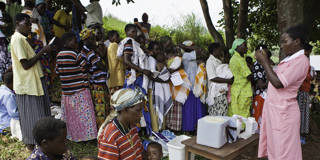Women have long been expected to volunteer as community-health workers, providing essential services in low- and middle-income countries for little to no pay. But governments that professionalize CHWs, which includes offering accreditation, training, and minimum wages, will accelerate progress toward “health for all.”
CLARKSVILLE, MD/KAMPALA – At least six million women worldwide provide unpaid or grossly underpaid labor in community-health centers, often in low- and middle-income countries (LMICs). Many work as community-health workers. But, though this is a skilled job that should be salaried, only 34 countries offer CHWs accreditation, training, and salaries, leaving the majority exploited and therefore less effective for their patients. If we are serious about making “health for all” a global priority, this must change.

CLARKSVILLE, MD/KAMPALA – At least six million women worldwide provide unpaid or grossly underpaid labor in community-health centers, often in low- and middle-income countries (LMICs). Many work as community-health workers. But, though this is a skilled job that should be salaried, only 34 countries offer CHWs accreditation, training, and salaries, leaving the majority exploited and therefore less effective for their patients. If we are serious about making “health for all” a global priority, this must change.